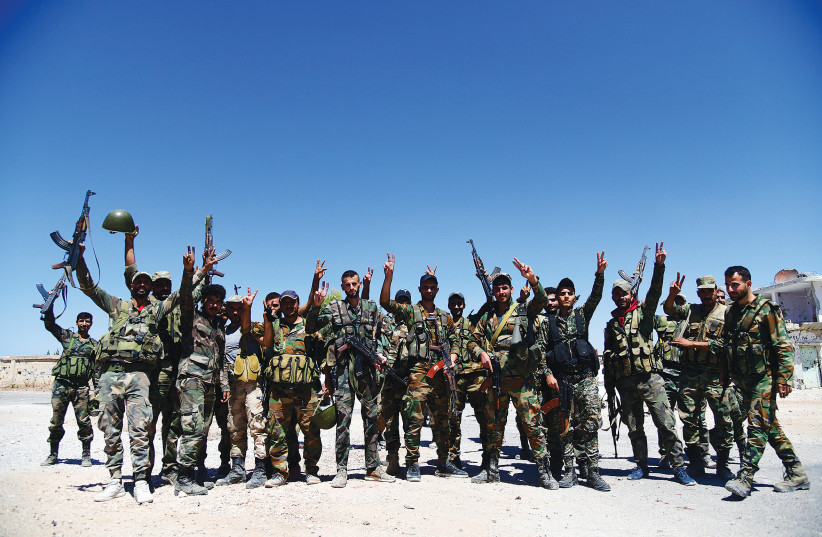A Jordanian soldier was killed and several soldiers wounded on Sunday, according to reports. The killing took place due to drug smuggling from Syria. The smugglers fled back to Syria, leaving behind a large cache of drugs, an army statement said, according to Reuters.
“The army will respond with all strength and resolve [against] any infiltration attempt to protect our borders and prevent anyone who dares to violate our national security,” the statement said.
This puts Amman in a bind. Jordan is in the news because the US has apparently encouraged Jordan and Egypt to be involved in supplying Lebanon’s energy needs. This could go through Syria, since that’s the most logical land corridor to Lebanon.
Jordan has been trying to stabilize relations with Syria for several years, and the king of Jordan received a call from Syrian regime leader Bashar Assad for the first time last October after many years of silence.
Jordan’s position is complex not only because it is on the border with Syria, with the Syrian Civil War about to spill over for many years. It has also hosted hundreds of thousands of Syrian refugees. Jordan welcomed them as brothers, and many of them even had tribal or family connections because southern Syria and northern Jordan have histories in common.

Jordan also hosted the “operations room” during the Syrian war. Reports noted in 2014 that Jordan “warily” assisted Syrian rebels. Other countries assisted these rebels as well, in some cases via Jordan. This included the United States, which even carved out a garrison in Tanf near the Jordan-Iraq border, just inside Syria.
The support for the rebels fell apart in 2018 when the Assad regime, with Russia’s backing, moved back into southern Syria and defeated the southern Syria rebels. Some of them took buses to Idlib, others stayed and joined a Russian-backed unit linked to the Syrian Army’s 5th Corps. Ahmed Audeh became a key figure in this unit.
Meanwhile, refugees in Jordan chose not to go home, afraid of repercussions. In addition, there has been continued fighting in southern Syria between disgruntled locals and the regime. There may be ISIS cells there as well, and Hezbollah has built up a presence.
The king of Jordan, like the United States in 2015, sought to shift to fighting ISIS. Since then, Jordan understands that stability is important in southern Syria.
However, the weakened Syrian regime has been hollowed out by war. Into the hollow has come Iranian tentacles via the Albukamal crossing and Imam Ali base on the border with Iraq. From there, Iran seeks to use a corridor not so far from Jordan to support operations against Israel from Syria. Airstrikes have targeted Iranian operations in Syria over the years. In 2019, Russia even claimed Israel was overflying Jordan to conduct airstrikes in Syria.
Add to this the recent attack. While Jordan wants stability, and other Arab countries, including Egypt, Iraq and the UAE, want some outreach to Syria, there are concerns about Syria’s ongoing slouching into the drug trade.
Drugs have often been a key trade for terrorist groups and Mafia-like narco-states. Hezbollah is involved in the international drug trade. Jordan is now concerned about all the drugs coming from Syria. These apparently are trucks destined for the Gulf.
“Last year, the Jordanian army said it shot down a drone flying a large quantity of drugs across the border,” Reuters reported. “Jordanian officials say Lebanon’s Iran-backed Hezbollah group and militias who hold sway in southern Syria are behind smuggling of one of the most popular banned drugs, a stimulant known as Captagon, which has a thriving market in the Arab Gulf. Hezbollah denies the accusations, calling them fabricated.”
Caroline Rose, a senior analyst and head of the Power Vacuums Program at the New Lines Institute for Strategy and Policy, has written extensively on the issue of the Captagon trade. “Captagon shipments continue to overwhelm regional law enforcement systems, with Saudi Arabia receiving millions of Captagon pills camouflaged among licit goods like oranges, pomegranates, cocoa beans, and grapes at its land and maritime ports,” she wrote in an article last November. “Similarly, Jordan has struggled to keep up with the trade, as its forces lack the necessary resources and personnel to intercept all suspicious cross-border shipments and contend with violent cross-border clashes with traffickers. And across the Mediterranean in Europe and Africa, seizures of Syrian-sourced Captagon have become more frequent, found smuggled in pizza ovens, cardboard cylinders, and industrial equipment.”
Another New Lines Institute article last November examined Jordan’s policy and the situation in Syria. “Jordan has served as a transit country for Captagon... and one of its hopes for increased cooperation with Syria is addressing smuggling from the north,” Abdulaziz Kilani wrote.
The drug trade has now resulted in casualties in Jordan. That’s bad news for Amman. Outreach to Syria has not cut down on the trade. Syria’s regime, which is under sanctions, apparently is using the trade to keep money flowing.
If the countries seeking outreach can’t cut down on the trade, then it’s not clear what their outreach to the Syrian regime is accomplishing. It should also call into question using Syria as an energy hub to supply Lebanon via Jordan.
